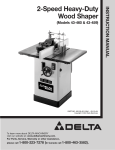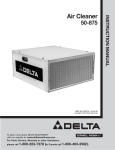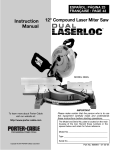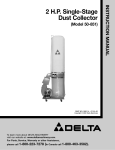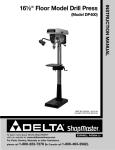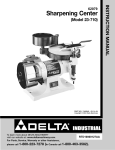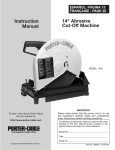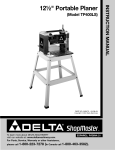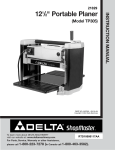Download Porter-Cable 1500 Saw User Manual
Transcript
ESPAÑOL: PÁGINA 17 FRANÇAISE : PAGE 33 Instruction manual Tile Saw MODEL 1500 To learn more about Porter-Cable visit our website at: http://www.porter-cable.com IMPORTANT Please make certain that the person who is to use this equipment carefully reads and understands these instructions before starting operations. The Model and Serial No. plate is located on the main housing of the tool. Record these numbers in the spaces below and retain for future reference. Model No. ______________________________________ Type ___________________________________________ Serial No. _______________________________________ Copyright © 2004 Porter-Cable Corporation Part No. 895736 - 04-28-04 SAFETY INSTRUCTIONS GROUNDING INSTRUCTIONS 1. All grounded, cord-connected tools: In the event of a malfunction or breakdown, grounding provides a path of least resistance for electric current to reduce the risk of electric shock. This tool is equipped with an electric cord having an equipmentgrounding conductor and a grounding plug. The plug must be plugged into a matching outlet that is properly installed and grounded in accordance with all local codes and ordinances. Do not modify the plug provided - if GROUNDED OUTLET BOX it will not fit the outlet, have the CURRENT proper outlet installed by a qualified CARRYING electrician. PRONGS Improper connection of the equipment-grounding conductor can result in risk of electric shock. The conductor with insulation GROUNDING PRONG having an outer surface that is IS LONGEST OF THE 3 PRONGS green with or without yellow stripes Fig. A is the equipment-grounding conductor. If repair or replacement GROUNDED OUTLET BOX of the electric cord or plug is necessary, do not connect the GROUNDING MEANS equipment-grounding conductor to ADAPTER a live terminal. Check with a qualified electrician or service personnel if the grounding instructions are not completely understood, or if in doubt as to whether the tool is properly grounded. Fig. B Use only 3-wire extension cords that have 3-prong grounding type GROUNDED OUTLET BOX plugs and matching 3-conductor receptacles that accept the tool’s CURRENT CARRYING plug, as shown in Fig. A. PRONGS Repair or replace damaged or worn cord immediately. 2. Grounded, cord-connected tools intended for use on a supply circuit GROUNDING PRONG having a nominal rating less than IS LONGEST OF THE 3 PRONGS 150 volts: Fig. C If the tool is intended for use on a circuit that has an outlet that looks like the one illustrated in Fig. A, the tool will have a grounding plug that looks like the plug illustrated in Fig. A. A temporary adapter, which looks like the adapter illustrated in Fig. B, may be used to connect this plug to a matching 2-conductor receptacle as shown in Fig. B if a properly grounded outlet is not available. The temporary adapter should be used only until a properly grounded outlet can be installed by a qualified electrician. The green-colored rigid ear, 2 lug, and the like, extending from the adapter must be connected to a permanent ground such as a properly grounded outlet box. Whenever the adapter is used, it must be held in place with a metal screw. NOTE: In Canada, the use of a temporary adapter is not permitted by the Canadian Electric Code. 3. Grounded, cord-connected tools intended for use on a supply circuit having a nominal rating between 150 - 250 volts, inclusive: If the tool is intended for use on a circuit that has an outlet that looks like the one illustrated in Fig. C, the tool will have a grounding plug that looks like the plug illustrated in Fig. C. Make sure the tool is connected to an outlet having the same configuration as the plug. No adapter is available or should be used with this tool. If the tool must be reconnected for use on a different type of electric circuit, the reconnection should be made by qualified service personnel; and after re-connection, the tool should comply with all local codes and ordinances. IN ALL CASES, MAKE CERTAIN THE RECEPTACLE IN QUESTION IS PROPERLY GROUNDED. IF YOU ARE NOT SURE HAVE A QUALIFIED ELECTRICIAN CHECK THE RECEPTACLE. NEVER REMOVE GROUNDING PRONG FROM POWER PLUG. EXTENSION CORDS Nameplate Ampere Rating Use proper extension cords. Make sure your extension cord is in good condition and is a 3-wire extension cord which has a 3prong grounding type plug and matching receptacle which will accept the tool’s plug. When using an extension cord, be sure to use one heavy enough to carry the current of the tool. An undersized cord will cause a drop in line voltage, resulting in loss of power and overheating. Fig. D, shows the correct gauge to use depending on the cord length. If in doubt, use the next heavier gauge. The smaller the gauge number, the heavier the cord. 115V 230V 25 Ft. 50 Ft. 50 Ft. 100 Ft. 0-2 2-3 3-4 4-5 5-6 6-8 8-10 10-12 12-14 14-16 16-18 18-20 18 18 18 18 18 18 18 16 16 16 14 14 18 18 18 18 16 16 14 14 12 12 12 12 Length of Cord in Feet 100 Ft. 150 Ft. 200 Ft. 250 Ft. 200 Ft. 300 Ft. 400 Ft. 500 Ft. 18 16 16 14 14 12 12 10 10 10 8 8 16 14 14 12 12 10 10 8 8 8 8 6 Fig. D 3 16 14 12 12 10 10 8 8 6 6 6 6 14 12 12 10 10 8 8 6 6 6 4 4 300 Ft. 600 Ft. 14 12 10 10 8 6 6 6 6 4 4 4 400 Ft. 500 Ft. 800 Ft. 1000 Ft. 12 10 10 8 8 6 6 4 4 4 2 2 12 10 8 8 6 6 4 4 2 2 2 2 SAFETY GUIDELINES - DEFINITIONS This manual contains information that is important for you to know and understand. This information relates to protecting YOUR SAFETY and PREVENTING EQUIPMENT PROBLEMS. To help you recognize this information, we use the symbols below. Please read the manual and pay attention to these sections. indicates an imminently hazardous situation which, if not avoided, will result in death or serious injury. indicates a potentially hazardous situation which, if not avoided, could result in death or serious injury. indicates a potentially hazardous situation which, if not avoided,may result in minor or moderate injury. used without the safety alert symbol indicates potentially hazardous situation which, if not avoided, may result in property damage. Some dust created by power sanding, sawing, grinding, drilling, and other construction activities contains chemicals known (to the State of California) to cause cancer, birth defects or other reproductive harm. Some example of these chemicals are: ● lead from lead-based paints ● crystalline silica from bricks and cement and other masonry products ● arsenic and chromium from chemically-treated lumber Your risk from these exposures varies, depending on how often you do this type of work. To reduce your exposure to these chemicals: work in a well ventilated area, and work with approved safety equipment, always wear MSHA/NIOSH approved, properly fitting face mask or respirator when using such tools. IMPORTANT SAFETY INSTRUCTIONS Read and understand all instructions. Failure to follow all instructions listed below, may result in electric shock, fire and/or serious personal injury. SAVE THESE INSTRUCTIONS. 1. For your own safety, read the instruction manual before operating the tool. Learn the tool’s application and limitations as well as the specific hazards peculiar to it. 2. Keep guards in place and in working order. 3. Always wear eye protection. Wear safety glasses. Everyday eyeglasses only have impact resistant lenses; they are not safety glasses. Also use face or dust mask if cutting operation is dusty. These safety glasses must conform to ANSI Z87.1 requirements. NOTE: Approved glasses have Z87 printed or stamped on them. 4. Remove adjusting keys and wrenches. Form habit of checking to see that keys and adjusting wrenches are removed from tool before turning it “on”. 5. Keep work area clean. Cluttered areas and benches invite accidents. 6. Don’t use in dangerous environment. Don’t use power tools in damp or wet locations, or expose them to rain. Keep work area well-lighted. 7. Keep children and visitors away. All children and visitors should be kept a safe distance from work area. 8. Make workshop childproof – with padlocks, master switches, or by removing starter keys. 9. Don’t force tool. It will do the job better and be safer at the rate for which it was designed. 10. Use the right tool. Don’t force tool or attachment to do a job for which it was not designed. 4 11. Wear proper apparel. No loose clothing, gloves, neckties, rings, bracelets, or other jewelry to get caught in moving parts. Nonslip footwear is recommended. Wear protective hair covering to contain long hair. 12. Secure work. Use clamps or a vise to hold work when practical. It’s safer than using your hand and frees both hands to operate tool. 13. Don’t overreach. Keep proper footing and balance at all times. 14. Maintain tools in top condition. Keep tools sharp and clean for best and safest performance. Follow instructions for lubricating and changing accessories. 15. Disconnect tools before servicing and when changing accessories such as blades, bits, cutters, etc. 16. Use recommended accessories. The use of accessories and attachments not recommended by Delta may cause hazards or risk of injury to persons. 17. Reduce the risk of unintentional starting. Make sure switch is in “OFF” position before plugging in power cord. In the event of a power failure, move switch to the “OFF” position. 18. Never stand on tool. Serious injury could occur if the tool is tipped or if the cutting tool is accidentally contacted. 19. Check damaged parts. Before further use of the tool, a guard or other part that is damaged should be carefully checked to ensure that it will operate properly and perform its intended function – check for alignment of moving parts, binding of moving parts, breakage of parts, mounting, and any other conditions that may affect its operation. A guard or other part that is damaged should be properly repaired or replaced. 20. Direction of feed. Feed work into a blade or cutter against the direction of rotation of the blade or cutter only. 21. Never leave tool running unattended. Turn power off. Don’t leave tool until it comes to a complete stop. 22. Stay alert, watch what you are doing, and use common sense when operating a power tool. Do not use tool while tired or under the influence of drugs, alcohol, or medication. A moment of inattention while operating power tools may result in serious personal injury. 23. Make sure tool is disconnected from power supply while motor is being mounted, connected or reconnected. 24. The dust generated by certain woods and wood products can be injurious to your health. Always operate machinery in well ventilated areas and provide for proper dust removal. Use wood dust collection systems whenever possible. 25. Wear ear protection to safeguard against possible hearing loss. 5 ADDITIONAL SPECIFIC SAFETY RULES 1. Disconnect saw before servicing, when changing cutting wheels, and cleaning. 2. Use splash hood for every operation for which it can be used. 3. To avoid the possibility of the appliance plug or receptacle getting wet, position tile saw to one side of a wall mounted receptacle to prevent water from dripping onto the receptacle or plug. The user should arrange a “drip loop” in the cord connecting the saw to a receptacle. The “drip loop” is that part of the cord below the level of the receptacle, or the connector if an extension cord is used, to prevent water traveling along the cord and coming in contact with the receptacle. 4. If the plug or receptacle does get wet, DON’T unplug the cord. Disconnect the fuse or circuit breaker that supplies power to the tool. Then unplug and examine for presence of water in the receptacle. 5. When the tool is not in use, the switch should be locked in the OFF position to prevent unauthorized use of the tool. 6. Make sure your fingers and hands are not in the cutting line of the blade. 7. Use only continuous wet cut diamond blades rated at 6000 RPMs or greater. Use tool only with smooth edge cutting wheels free of openings and grooves. 8. Check water level and operation of pump before each use. 9. Replace damaged cutting wheel before operating tile saw. 10. Do not fill water bath above water fill line. 11. Only plug water pump cord into motor receptacle. 12. Ground Fault Circuit Interrupter (GFCI) protection should be provided on the circuit(s) or outlet(s) to be used for the tile saw. Improper operation or maintenance of this product could result in serious injury and property damage. Read and understand all warnings and operating instructions before using this tool. When using power tools, basic safety precautions should always be followed to reduce the risk of personal injury. For additional information visit our website www.porter-cable.com. Additional Information regarding the safe and proper operation of power tools (i.e. a safety video) is available from the Power Tool Institute, 1300 Sumner Avenue, Cleveland, OH 44115-2851 (www.powertoolinstitute.com). Additional Information is also available from the National Safety Council, 1121 Spring Lake Drive, Itasca, IL 60143-3201, the American National Standards Institute ANSI 01.1Safety Requirements for Woodworking Machines, and the U.S. Department of Labor regulations. 6 There are certain applications for which this tool was designed. Porter-Cable strongly recommends that this tool NOT be modified and/or used for any application other than for which it was designed. If you have any questions relative to its application DO NOT use the tool until you have written Porter-Cable and we have advised you. Technical Service Manager Porter-Cable Corporation 4825 Highway 45 North Jackson, TN 38305 SYMBOL V A Hz W kW µF l kg N/cm2 Pa h min s ........................ ........................ ........................ ........................ ........................ ........................ ........................ ........................ ........................ ........................ ........................ ........................ ........................ DEFINITION volts amperes hertz watts kilowatts microfarads liters kilograms newtons per square centimeter pascals hours minutes seconds ........................ alternating current 3 ........................ three-phase alternating current 3N ........................ three-phase alternating current with neutral n0 ........................ direct current ........................ no load speed ........................ alternating or direct current ........................ Class II Construction ........................ splash-proof construction ........................ watertight construction …/min ........................ revolutions or reciprocation per minute SAVE THESE INSTRUCTIONS REPLACEMENT PARTS When servicing use only identical replacement parts. MOTOR Many Porter-Cable tools will operate on either D.C., or single phase 25 to 60 cycle A.C. current and voltage within plus or minus 5 percent of that shown on the specification plate on the tool. Several models, however, are designed for A.C. current only. Refer to the specification plate on your tool for proper voltage and current rating. 7 Do not operate your tool on a current on which the voltage is not within correct limits. Do not operate tools rated A.C. only on D.C. current. To do so may seriously damage the tool. FUNCTIONAL DESCRIPTION FOREWORD Porter-Cable Model 1500 Tile Saw is designed to cut ceramic tile. The Model 1500 is powered by a 7.4 amp motor. The tile saw has the capacity to cut 14" in length, 10" x 10” tile cut diagonally, and 2" depth cut. ASSEMBLY UNPACKING 1. Carefully remove the machine from the carton. We recommend you retain all packing materials until after you have inspected and satisfactorily operated the machine. Do not connect the machine to the power source until you have read and understood this entire instruction manual. 2. Place the machine on a firm, level surface where there is plenty of room for handling and properly supporting the workpiece. 3. Familiarize yourself with all features and controls as explained in this manual. 4. Unassembled items are shown in Fig. 1, for identification and use in assembling the saw. C D Q B R E J F O I K G P M A N Fig. 1 A B C D E F Water tray (1) Cutting tray (1) Saw arm (1) Motor (1) Water pump (1) Water plug (1) G I J K M ¼ - 20 x 1/2" Flat head screws (5) Inner and outer blade flange Blade (1) Hex wrench (1) Flange wrench (1) 8 N O P Q R Arbor wrench (1) Arbor nut (1) Rip guide (1) Cable tie (3) Hose adapter (1) ASSEMBLY 1. 2. Locate and identify all parts. Insert the plug (F) Fig. 1, into the water tray (A) Fig. 1. The plug should be inserted into the top of the water tray as shown in Fig. 2. ATTACHING THE MOTOR TO THE SAW ARM 1. 2. Place the motor on a flat surface. Line up the 3 holes (A) Fig. 3, in the motor, with the 3 holes (A) Fig. 4 in the saw arm. 3. Thread each screw (G) Fig. 1, through the holes in the saw arm to the holes in the motor. Fig. 2 A B Make sure that the motor grounding tab (B) Fig. 3, stays in place when attaching the motor to the saw arm, for this provides a means of grounding the motor. 4. Once the screws are threaded into the saw arm and motor, Fig. 5, tighten securely. Fig. 3 A Fig. 4 Fig. 5 9 ATTACHING SAW ARM TO THE CUTTING TRAY 1. 2. 3. 4. 5. Insert the water pump hose into the largest hole in the side of the cutting tray (from the outside) Fig. 6, pull the hose through the hole. Position the saw arm (C) Fig. 1, onto the cutting tray as shown in Fig. 7. Insert 2 screws (G) Fig. 1, through the 2 holes on the inside of the cutting tray Fig. 8, and tighten securely. Place the water pump (E) Fig. 1, into the bottom of the water tray Fig. 9. Attach the water pump hose, from the saw, to the water pump with the hose adapter (R) Fig. 1, as shown in Fig. 9. Fig. 6 Fig. 7 Fig. 8 Fig. 9 10 Fig. 10 6. 7. 8. Plug the water pump cord into the motor plug receptacle (Fig. 10). NOTE: Place cord through the cord slot (Fig.11A), in the water tray. Only plug water pump cord into motor receptacle. Loosen the water hose clamp (A) Fig. 11B, and insert cable tie (Q) Fig. 1, through the water hose clamp. Secure water pump cord and motor cord to saw arm with cable tie as shown in Fig. 11C. Tighten the water hose clamp (A) Fig. 11B. Secure water pump hose and cord to the cutting tray frame with cable tie (Q) Fig. 1, as shown in Fig. 11D. ATTACHING THE SAW BLADE 1. Fig. 11A A Fig. 11B Fig. 11C NOTE: Use only continuous wet cut diamond blades rated at 6000 RPMs or greater. Loosen knob (A) Fig. 12, and open the blade cover. A Fig. 11D Fig. 12 11 2. 3. 4. 5. 6. 7. Place the inner flange (I) Fig. 1, onto the motor arbor as shown in Fig. 13 Place the blade (J) Fig. 1, onto the motor arbor. NOTE: Make sure the blade is placed on the arbor with the arrow on the blade facing counter-clockwise, as shown in Fig. 14. Place the outer flange (I) Fig. 1, onto the motor as shown in Fig. 15. Tighten the arbor nut (O) Fig. 1, onto the arbor Fig. 16 using the 2 wrenches provided (M,N) Fig. 1. NOTE: Wrench (M) Fig. 1, is used to hold the arbor in place while wrench (N) Fig. 1, is used to tighten the arbor nut onto the arbor. Close blade cover and tighten blade cover knob (A) Fig. 12. Attach the rip guide (P) Fig. 1 to the cutting tray by loosening the locking knob and placing the rip guide onto the front of the cutting tray and tighten the locking knob Fig 17. Fig. 13 Fig. 14 Fig. 15 Fig. 17 Fig. 16 OPERATION STARTING AND STOPPING MACHINE Make sure switch is OFF and power circuit voltage is the same as that shown on the specification plate. 12 Connect machine to power circuit. NOTE: To avoid the possibility of the appliance plug or receptacle getting wet, position tile saw to one side of a wall mounted receptacle to prevent water from dripping onto the receptacle or plug. The user should arrange a “drip loop” Fig. 18, in the cord connecting the saw to a receptacle. The “drip loop” is that part of the cord below the level of the receptacle, or the connector if an extension cord is used, to prevent water traveling along the cord and coming in contact with the receptacle. 1. To start the machine, slide the switch button (A) Fig. 19, down until the switch locks into the ON position. 2. To stop the machine, press on the upper end of the switch button (A) Fig. 20. Fig. 18 A Fig. 19 A LOCKING SWITCH N THE “OFF” POSITION IMPORTANT: When the tool is not in use, the switch should be locked in the OFF position using a padlock (A) Fig. 21, to prevent unauthorized use of the tool. OPERATING TILE SAW Fig. 20 Before operating the tool, make sure the tile saw is assembled properly. Fill water tray to fill line and be sure pump is totally submerged. Check water level and operation of pump before each use. To cut tile, place the tile on the cutting tray and turn the machine on. Hold the tile firmly against the cutting tray with both hands. A Fig. 21 Make sure your fingers and hands are not in the cutting line of the blade (A) Fig. 22A. Push the cutting tray forward towards the blade, feed the tile slowly and evenly into the cutting blade until the tile has been cut through completely. Pull the tray backwards until the cutting tray is in the rear most position and remove the cut tile. 13 A Fig. 22A WATER PUMP The flow rate dial (A) Fig. 22B, should be set on the maximum setting. RIP GUIDE A The rip guide (A) Fig. 22A is used to make precision cuts. Loosen knob (B), position the rip guide on the cutting tray scale to the amount of tile to be cut off and then tighten knob. Hold the tile against the rip guide and the cutting tray and proceed to cut the tile as discussed in the section “OPERATING TILE SAW.” Fig. 22B MAINTENANCE KEEP TOOL CLEAN A Periodically blow out all air passages with dry compressed air. All plastic parts should be cleaned with a soft damp cloth. NEVER use solvents to clean plastic parts. They could possibly dissolve or otherwise damage the material. Wear ANSI Z87.1 safety glasses while using compressed air. Fig. 23 FAILURE TO START The cutting tray can be detached for cleaning purposes by pulling the locking pin (A) Fig. 23 out, so that the tray can slide off the rail. Change water in water tray daily. Do not leave water in water tray overnight. Should your tool fail to start, check to make sure the prongs on the cord plug are making good contact in the outlet. Also, check for blown fuses or open circuit breakers in the line. Do not cut tile without using the tile cutting tray. 14 FAILURE TO START Should your tool fail to start, check to make sure the prongs on the cord plug are making good contact in the outlet. Also, check for blown fuses or open circuit breakers in the line. LUBRICATION This tool has been lubricated with a sufficient amount of high-grade lubricant for the life of the unit under normal operating conditions. No further lubrication is necessary. BRUSH INSPECTION AND LUBRICATION For your continued safety and electrical protection, brush inspection and replacement on this tool should ONLY be performed by an AUTHORIZED PORTER-CABLE SERVICE STATION or a PORTER-CABLE SERVICE CENTER. At approximately 100 hours of use, take or send your tool to your nearest Authorized Porter-Cable Service Station to be thoroughly cleaned and inspected; worn parts replaced, when necessary, relubricated with fresh lubricant, if required; reassembled with new brushes; and performance tested. Any loss of power before the above maintenance check may indicate the need for immediate servicing of your tool. DO NOT CONTINUE TO OPERATE TOOL UNDER THIS CONDITION. If proper operating voltage is present, return your tool to the service station for immediate service. SERVICE AND REPAIRS All quality tools will eventually require servicing or replacement of parts due to wear from normal use. These operations, including brush inspection and replacement, should ONLY be performed by either an AUTHORIZED PORTER-CABLE SERVICE STATION or a PORTER-CABLE SERVICE CENTER. All repairs made by these agencies are fully guaranteed against defective material and workmanship. We cannot guarantee repairs made or attempted by anyone other than these agencies. Should you have any questions about your tool, feel free to write us at any time. In any communications, please give all information shown on the nameplate of your tool (model number, type, serial number, etc.). ACCESSORIES A complete line of accessories is available from your Porter-Cable • Delta Supplier, Porter-Cable • Delta Factory Service Centers, and Porter-Cable Authorized Service Stations. Please visit our Web Site www.porter-cable.com for a catalog or for the name of your nearest supplier. Since accessories other than those offered by Porter-Cable • Delta have not been tested with this product, use of such accessories could be hazardous. For safest operation, only Porter-Cable • Delta recommended accessories should be used with this product. 15 PORTER-CABLE LIMITED ONE YEAR WARRANTY Porter-Cable warrants its Professional Power Tools for a period of one year from the date of original purchase. We will repair or replace at our option, any part or parts of the product and accessories covered under this warranty which, after examination, proves to be defective in workmanship or material during the warranty period. For repair or replacement return the complete tool or accessory, transportation prepaid, to your nearest Porter-Cable Service Center or Authorized Service Station. Proof of purchase may be required. This warranty does not apply to repair or replacement required due to misuse, abuse, normal wear and tear or repairs attempted or made by other than our Service Centers or Authorized Service Stations. ANY IMPLIED WARRANTY, INCLUDING THE IMPLIED WARRANTIES OF MERCHANTABILITY AND FITNESS FOR A PARTICULAR PURPOSE, WILL LAST ONLY FOR ONE (1) YEAR FROM THE DATE OF PURCHASE. To obtain information on warranty performance please write to: PORTER-CABLE CORPORATION, 4825 Highway 45 North, Jackson, Tennessee 38305; Attention: Product Service. THE FOREGOING OBLIGATION IS PORTER-CABLE’S SOLE LIABILITY UNDER THIS OR ANY IMPLIED WARRANTY AND UNDER NO CIRCUMSTANCES SHALL PORTER-CABLE BE LIABLE FOR ANY INCIDENTAL OR CONSEQUENTIAL DAMAGES. Some states do not allow limitations on how long an implied warranty lasts or the exclusion or limitation of incidental or consequential damages, so the above limitation or exclusion may not apply to you. This warranty gives you specific legal rights and you may also have other legal rights which vary from state to state. 16 PORTER-CABLE • DELTA SERVICE CENTERS (CENTROS DE SERVICIO DE PORTER-CABLE • DELTA) (CENTRE DE SERVICE PORTER-CABLE • DELTA) Parts and Repair Service for Porter-Cable • Delta Power Tools are Available at These Locations (Obtenga Refaccion de Partes o Servicio para su Herramienta en los Siguientes Centros de Porter-Cable • Delta) (Locations où vous trouverez les pièces de rechange nécessaires ainsi qu’un service d’entretien) ARIZONA Tempe 85282 (Phoenix) 2400 West Southern Avenue Suite 105 Phone: (602) 437-1200 Fax: (602) 437-2200 GEORGIA Forest Park 30297 (Atlanta) 5442 Frontage Road, Suite 112 Phone: (404) 608-0006 Fax: (404) 608-1123 CALIFORNIA Ontario 91761 (Los Angeles) 3949A East Guasti Road Phone: (909) 390-5555 Fax: (909) 390-5554 ILLINOIS Addison 60101 (Chicago) 400 South Rohlwing Rd. Phone: (630) 424-8805 Fax: (630) 424-8895 San Diego 92111 7638 Clairemnot Blvd. Phone: (858) 277-9595 Fax: (858) 277-9696 Woodridge 60517 (Chicago) 2033 West 75th Street Phone: (630) 910-9200 Fax: (630) 910-0360 San Leandro 94577 (Oakland) 3039 Teagarden Street Phone: (510) 357-9762 Fax: (510) 357-7939 MARYLAND Elkridge 21075 (Baltimore) 7397-102 Washington Blvd. Phone: (410) 799-9394 Fax: (410) 799-9398 COLORADO Arvada 80003 (Denver) 8175 Sheridan Blvd., Unit S Phone: (303) 487-1809 Fax: (303) 487-1868 FLORIDA Davie 33314 (Miami) 4343 South State Rd. 7 (441) Unit #107 Phone: (954) 321-6635 Fax: (954) 321-6638 MINNESOTA Minneapolis 55429 5522 Lakeland Avenue North Phone: (763) 561-9080 Fax: (763) 561-0653 Cleveland 44125 8001 Sweet Valley Drive Unit #19 Phone: (216) 447-9030 Fax: (216) 447-3097 MISSOURI North Kansas City 64116 1141 Swift Avenue Phone: (816) 221-2070 Fax: (816) 221-2897 OREGON Portland 97230 4916 NE 122 nd Ave. Phone: (503) 252-0107 Fax: (503) 252-2123 St. Louis 63119 7574 Watson Road Phone: (314) 968-8950 Fax: (314) 968-2790 PENNSYLVANIA Willow Grove 19090 (Philadelphia) 520 North York Road Phone: (215) 658-1430 Fax: (215) 658-1433 NEW YORK Flushing 11365-1595 (N.Y.C.) 175-25 Horace Harding Expwy. Phone: (718) 225-2040 Fax: (718) 423-9619 NORTH CAROLINA Charlotte 28270 9129 Monroe Road, Suite 115 Phone: (704) 841-1176 Fax: (704) 708-4625 MASSACHUSETTS Franklin 02038 (Boston) Franklin Industrial Park 101E Constitution Blvd. Phone: (508) 520-8802 Fax: (508) 528-8089 MICHIGAN Madison Heights 48071 (Detroit) 30475 Stephenson Highway Phone: (248) 597-5000 Fax: (248) 597-5004 OHIO Columbus 43214 4560 Indianola Avenue Phone: (614) 263-0929 Fax: (614) 263-1238 TEXAS Carrollton 75006 (Dallas) 1300 Interstate 35 N, Suite 112 Phone: (972) 446-2996 Fax: (972) 446-8157 Houston 77043 4321 Sam Houston Parkway, West Suite 180 Phone: (713) 983-9910 Fax: (713) 983-6645 WASHINGTON Auburn 98001(Seattle) 3320 West Valley HWY, North Building D, Suite 111 Phone: (253) 333-8353 Fax: (253) 333-9613 Tampa 33609 4538 W. Kennedy Boulevard Phone: (813) 877-9585 Fax: (813) 289-7948 Authorized Service Stations are located in many large cities. Telephone 800-487-8665 or 731-541-6042 for assistance locating one. Parts and accessories for Porter-Cable • Delta products should be obtained by contacting any Porter-Cable • Delta Distributor, Authorized Service Center, or Porter-Cable • Delta Factory Service Center. If you do not have access to any of these, call 888-848-5175 and you will be directed to the nearest Porter-Cable • Delta Factory Service Center. Las Estaciones de Servicio Autorizadas están ubicadas en muchas grandes ciudades. Llame al 800-487-8665 ó al 731-541-6042 para obtener asistencia a fin de localizar una. Las piezas y los accesorios para los productos PorterCable • Delta deben obtenerse poniéndose en contacto con cualquier distribuidor Porter-Cable • Delta, Centro de Servicio Autorizado o Centro de Servicio de Fábrica Porter-Cable • Delta. Si no tiene acceso a ninguna de estas opciones, llame al 888-848-5175 y le dirigirán al Centro de Servicio de Fábrica Porter-Cable • Delta más cercano. Des centres de service agréés sont situés dans beaucoup de grandes villes. Appelez au 800-487-8665 ou au 731-541-6042 pour obtenir de l’aide pour en repérer un. Pour obtenir des pièces et accessoires pour les produits PorterCable • Delta, s’adresser à tout distributeur Porter-Cable • Delta, centre de service agréé ou centre de service d’usine Porter-Cable • Delta. Si vous n’avez accès à aucun de ces centres, appeler le 888-848-5175 et on vous dirigera vers le centre de service d’usine Porter-Cable • Delta le plus proche. CANADIAN PORTER-CABLE • DELTA SERVICE CENTERS ALBERTA Bay 6, 2520-23rd St. N.E. Calgary, Alberta T2E 8L2 Phone: (403) 735-6166 Fax: (403) 735-6144 MANITOBA 1699 Dublin Avenue Winnipeg, Manitoba R3H 0H2 Phone: (204) 633-9259 Fax: (204) 632-1976 BRITISH COLUMBIA 8520 Baxter Place Burnaby, B.C. V5A 4T8 Phone: (604) 420-0102 Fax: (604) 420-3522 ONTARIO 505 Southgate Drive Guelph, Ontario N1H 6M7 Phone: (519) 767-4132 Fax: (519) 767-4131 QUÉBEC 1515 Ave. St-Jean Baptiste, Suite 160 Québec, P.Q. G2E 5E2 Phone: (418) 877-7112 Fax: (418) 877-7123 1447, Begin St-Laurent, (Mtl), P.Q. H4R 1V8 Phone: (514) 336-8772 Fax: (514) 336-3505 The following are trademarks of PORTER-CABLE • DELTA (Las siguientes son marcas registradas de PORTER-CABLE • DELTA S.A.) (Les marques suivantes sont des marques de fabriquant de la PORTER-CABLE • DELTA): Auto-Set®, BAMMER®, B.O.S.S.®, Builder’s Saw®, Contractor’s Saw®, Contractor’s Saw II™, Delta®, DELTACRAFT®, DELTAGRAM™, Delta Series 2000™, DURATRONIC™, Emc²™, FLEX®, Flying Chips™, FRAME SAW®, Grip Vac™, Homecraft®, INNOVATION THAT WORKS®, Jet-Lock®, JETSTREAM®, ‘kickstand®, LASERLOC®, MICROSET®, Micro-Set®, MIDI LATHE®, MORTEN™, NETWORK™, OMNIJIG®, POCKET CUTTER®, PORTA-BAND®, PORTA-PLANE®, PORTERCABLE®&(design), PORTER-CABLE®PROFESSIONAL POWER TOOLS, PORTER-CABLE REDEFINING PERFORMANCE™, Posi-Matic®, Q3®&(design), QUICKSAND®&(design), QUICKSET™, QUICKSET II®, QUICKSET PLUS™, RIPTIDE™&(design), SAFE GUARD II®, SAFE-LOC®, Sanding Center®, SANDTRAP®&(design), SAW BOSS®, Sawbuck™, Sidekick®, SPEED-BLOC®, SPEEDMATIC®, SPEEDTRONIC®, STAIR EASE®, The American Woodshop®&(design), The Lumber Company®&(design), THE PROFESSIONAL EDGE®, THE PROFESSIONAL SELECT®, THINLINE™, TIGER®, TIGER CUB®, TIGER SAW®, TORQBUSTER®, TORQ-BUSTER®, TRU-MATCH™, TWIN-LITE®, UNIGUARD®, Unifence®, UNIFEEDER™, Unihead®, Uniplane™, Unirip®, Unisaw®, Univise®, Versa-Feeder®, VERSA-PLANE® , WHISPER SERIES®, WOODWORKER’S CHOICE™. Trademarks noted with ™ and ® are registered in the United States Patent and Trademark Office and may also be registered in other countries. Las Marcas Registradas con el signo de ™ y ® son registradas por la Oficina de Registros y Patentes de los Estados Unidos y también pueden estar registradas en otros países. Marques déposées, indiquées par la lettre ™ et ®, sont déposées au Bureau des brevets d’invention et marques déposées aux Etats-Unis et pourraient être déposées aux autres pays. Printed in U.S.A. PC-0104-150


















